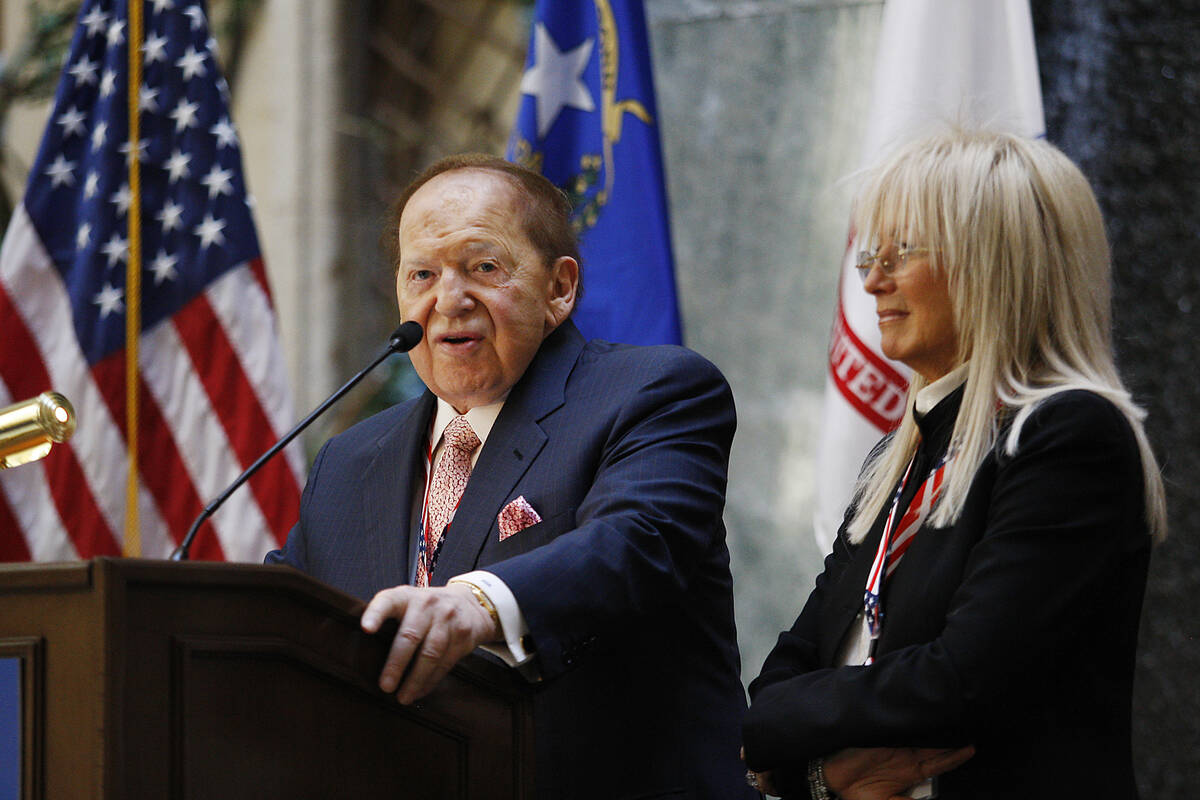COMMENTARY: His candle will burn eternal

Beloved family, beloved friends:
More than a century ago, the story goes, a boy with polio was abandoned at an orphanage in Nebraska.
He had to be carried up and down the stairs by the other boys. When asked if this was hard, one of the boys doing the carrying answered: “He ain’t heavy. He’s my brother.”
That line became a famous ballad, sung by Neil Diamond and The Hollies in the 1970s. And, decades later, a variation of it would arise spontaneously in my mind after Sheldon was struck with painful neuropathy and had to lean on me when he walked:
“He ain’t heavy. He’s my husband!”
It felt effortless, because I was so proud and fulfilled to be not just his wife, the mother of his children, and his partner in business and philanthropy — but also his helpmate …
… or, as Sheldon liked to say: the wind beneath his wings.
How strange it is that the heaviness I did not feel back then has, since his passing, been with me each and every day.
It is the heaviness of a great absence — of a great man, greatly missed.
It is the heaviness of a broken heart.
Beloved family, beloved friends:
A Yahrzeit is meant to bring some closure.
It marks the passing of a year — that universal, unignorable landmark in time — since the passing of our loved one. The cycle of four seasons. An orbit of the Earth around the sun.
A Yahrzeit is meant to bring some distance.
It finds us a year older while the person we mourn remains forever the same age. It finds us borne up or burdened, made wiser or worn down by experiences he or she will never know.
As a committed Jew, as a believer in the sacred traditions of Israel, I embrace this first Yahrzeit for Sheldon — the love of my life, my soul-mate.
But, I confess, it brings me little closure or distance.
Sheldon was so full of passion and compassion, so abounding in dreams and diligence. He squeezed dozens of lifetimes and careers into his 87 and a half years. Someone who burns that bright cannot but leave an afterglow when he is gone.
And, indeed, Sheldon lives on: in the children and grandchildren who are so reminiscent of him; in the philanthropic projects that bear his name; in the industries and city skylines that he created or reshaped; in the gratitude of the countless people who benefited from his leadership and largess.
Hardly a day goes by without me receiving a letter from strangers, recalling the kindnesses Sheldon did for them.
Hardly a day goes by without me asking out loud “What would Sheldon do?” regarding an important decision.
For a year, now, Sheldon has not leaned on me. Indeed, the roles are reversed. Wherever I go, whatever I do, I imagine myself leaning on him — for advice, for encouragement, for the sharing of the most intimate memories.
Why would anyone want closure on that kind of love? Why would anyone want distance from such a fusion of two hearts and minds?
Beloved family, beloved friends:
We came here to commemorate Sheldon. To say Kaddish on the Mount of Olives, where he lies among the saints and statesmen of Zion. To light memorial candles symbolizing his eternal spirit.
But we are also mindful of God’s instruction in the Bible: “I have set before you life and death, the blessing and the curse. Therefore, choose life!”
I have long quoted this line to comfort those who have suffered bereavement.
And, over the past year, I have recited it to myself daily.
Now, this first Yahrzeit — and, by coincidence, the new Gregorian year — is the time to make that choice.
I choose to emerge and embrace life anew.
The children and grandchildren that Sheldon so cherished are growing in maturity, and I intend to be there for them all, in my fullest and my best.
And I will do this — we will all do this — in the knowledge that it is what Sheldon would have wanted. That he is with us, his memory illuminating and warming our lives like a candle that will never go out.
Thank you.
Dr. Miriam Adelson, a physician, medical researcher and philanthropist, is the widow of Sheldon Adelson. The Adelson family owns the Review-Journal.